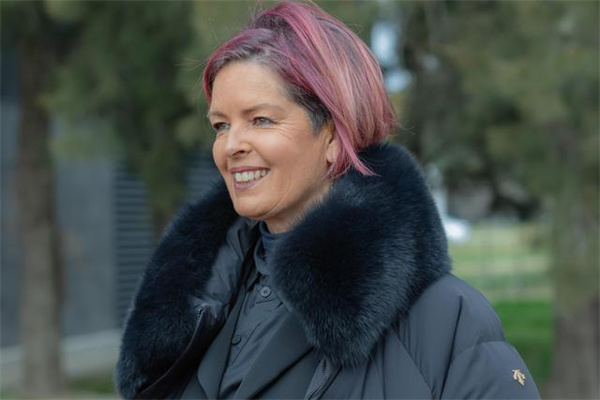

Australian journalist Tracey Holmes knows many Chinese athletes perhaps better than many Chinese people do. A presenter with the Australian Broadcasting Corporation, the senior sports reporter has covered 14 Olympic Games since 1992. She has also worked in China for about 10 years.
Sports events, she notes, can help forge people-to-people relationships, build mutual understanding and trust, and help eliminate misunderstanding and suspicion.
Holmes has a strong connection with China. Her paternal great-great-grandfather was a doctor of Chinese medicine surnamed Lin, who arrived in Australia from East China's Fujian province in the 1850s. He treated Chinese gold miners in Australia, where he settled down, married a local woman and changed their children's surname to Holmes to avoid racial discrimination.
Tracey Holmes lived and worked in Hong Kong in the early 2000s, when she paid her first visit to the Chinese mainland.
"My husband was working for CNN and they asked him to go to Beijing to be the senior bureau correspondent there," Holmes says.
She can still recall vividly how she felt back then. "From the moment I stepped off the plane, I strangely felt like I was at home," she says. "It seemed like a normal city, with the smells and the bustle and the energy, but I'd never been before."
She describes the visit, when they looked for an apartment to live in and schools to send their three sons to, as "a journey of exploration". They also went to tourist attractions such as the Great Wall, the Forbidden City, and Houhai Lake in central Beijing, where they skated when it froze in winter. "I think what's amazing about all of these places is they're more than tourist destinations; they're full of history," says Holmes.
After moving to China, Holmes worked for China Central Television and China Global Television Network for several years, and she has interviewed many Chinese athletes, including hurdler Liu Xiang, tennis player Li Na, and Lang Ping, coach of China's national women's volleyball team known as the "Iron Hammer".
During the 2008 Beijing Olympics, she worked as an anchor with CCTV. "Beijing was just incredible in 2008," she says. "The world was there for the first time and experiencing what Beijing had to offer."
Talking about her work experience in China, she says: "I always feel comfortable among the many friends that I've made while living in China, and I feel like I'm part of that group."
She adds that she and her friends have shared so many "great stories", "great meals" and "great laughs" that it's a very special place in her heart.
Holmes' latest visit to China was earlier this year for the Beijing Winter Olympics. During the visit she saw the changes in Beijing, in terms of development and expansion.
In spite of the COVID-19 pandemic, the broadcaster says that athletes "felt incredibly safe" during the Winter Olympics. "In fact, from competing around the world in two years of COVID, it was the safest they had felt," she says.
However, the pandemic meant that she was not able to leave the "Olympic bubble". Although she managed to meet some of her Chinese friends who were covering the event as well, she says that "there's nothing like walking the streets of the city and talking to its people".
She stresses the importance of how people-to-people relationships are enhanced by sports events. "When the athletes of the world come together, that helps create understanding to create a better world," she notes.
Although, saying that, like all relationships, "sometimes the road is rocky", she remains optimistic about a future when the Australia-China relationship can emerge even stronger.
"Because, despite our differences, together we share one planet. It is in both our interests to guarantee this planet's peaceful future," she adds. "I hope sport continues to lead in that domain."